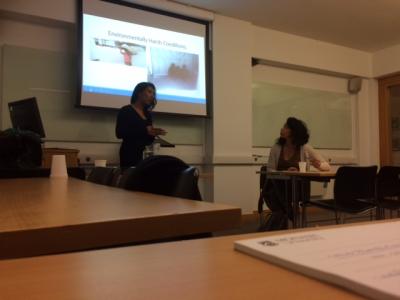Child Protection Failures and Mental Harm in Detention: Experiences of a Whistleblower on Nauru
Posted:
Time to read:
Guest post by Maeve Moynihan. Maeve is an MSc Migration Studies candidate at St. Antony’s College, Oxford and a co-convenor of the Refugee and Migration Law Discussion Group. Her research focuses on asylum seekers in Direct Provision Centers in rural Ireland.
As the Refugee and Migration Law Discussion Group continues another term of lectures, we share a review of our last event of Michaelmas term, co-sponsored with Border Criminologies, alongside the Children’s and Family Law Discussion Group, in the University of Oxford, Faculty of Law.

‘What’s the point if you don’t speak out?’ With this poignant question, Viktoria Vibhakar, L.C.S.W., Ph.D., and whistleblower concluded a compelling presentation about child detention on Nauru on Tuesday November 27, 2019. Vibhakar, a former child protection worker with Save the Children Australia, illuminated the stark realities of child-protection failures on the island of Nauru, one of Australia’s infamous offshore detention centers for asylum seekers and refugees. Jessica Oddy, a Ph.D. student at the University of East London and a child-services practitioner, joined Dr. Vibhakar as a discussant and facilitator. Together, the two led a heavy, but informative, discussion about the grave child protection failures on Nauru and lack of legal remedies to address such dire circumstances.
Vibhakar and Oddy focused on the human rights violations for children and the lack of legal pathways to address such violations. From 2013 to 2014, Dr. Vibhakar worked directly with families and children detained on Nauru as they navigated the challenges of everyday life in limbo on the island. Throughout her time there, Vibhakar observed intense depression, sexual assault, physical and emotional abuse, and children expressing a desire to take their own life. Children on the island experience intense trauma, poor living conditions, a lack of schooling and activity, and the uncertainty of ‘indefinite, arbitrary detention’ as Vibhakar outlined. With no prospect of release or a future, some children have developed ‘traumatic withdrawal syndrome.’ They disengage from activities, refuse to eat or get up from bed, and eventually shut down physically and emotionally into a coma-like state requiring intensive medical care.
Vibhakar highlighted that although the Australian government acknowledges and does not dispute the medical research showing that detention causes harm, they have refused to change their policies of indefinite, arbitrary detention, even as it applies to children.
The lack of an appropriate response by the Australian government and her organisation, Save the Children Australia, regarding the systematic abuse of children and people seeking asylum on Nauru concerned Vibhakar. During her time on the island, Save the Children Australia failed to disclose or appropriately address the extensive harm occurring to children and adults in Nauru, as they were profiting from contracts with the Australian government there. As a result, Dr. Vibhakar was ethically compelled to report the child protection failures and human rights violations herself. Dr. Vibhakar compiled case reports and evidence of the violations over a series of months, culminating in an extensive report of the child-protection failures she witnessed. She provided all of this material to the Australian Human Rights Commission for their inquiry into children in immigration detention in 2014. Four years later, the government has done little to address that harm, leading many, including human rights organizations and hundreds of Australian doctors, to call for the removal of children from Nauru and to characterize the situation on Nauru as a ‘mental health crisis’ for children and adults alike. Due to the advocacy and activism of human rights organizations, civil society, and individuals like Vibhakar, the last four of the initial 119 children were removed from Nauru this past week.
In the discussion at the event, members of the audience posited the potential use of international frameworks and governing bodies, such as the UNHCR, to address the presence of detained migrant children, and to address the wider implications of child detention around the world. People were worried that the offshore processing model at Nauru will be exported and used in other countries. Vibhakar appealed to discussion members to speak out about these violations through advocacy, activism, and academic work.
Vibhakar and Oddy also recommended two books for those interested in engaging further:
- No Friend but the Mountains chronicles Kurdish journalist Behrouz Boochani’s experience as a detainee of Manus island. Written from his mobile phone, the book gives a first-hand account of Boochani’s life as a detainee on Manus island since 2013 and recently won Australia’s most prestigious literary prize.
- Linda Tuhiwai Smith’s Decolonizing Methodologies: Research and Indigenous Peoples illuminates the Western-centric and colonial basis of academic research. In the second edition, published in 2012, Tuhiwai chronicles academia’s deep roots in imperialism and presents the multitude of indigenous literatures that the academic world silences.
For those interested in presenting or discussing topics in a similar forum, the Refugee and Migration Law Discussion Group welcomes offers to present papers or other works-in-progress to the group or to lead discussion. Please contact one of the convenors if you are interested in talking to the group or if you have an idea for an informal discussion.
Note: The group’s co-convenors are Maayan Ravid, Teresa Büchsel, Emilie McDonnell and Maeve Moynihan. Our Senior Member is Professor Cathryn Costello. If you would like to join the group’s mailing list, please send a blank email to: refugee_migration-subscribe@maillist.ox.ac.uk. You can also join our Facebook group at: https://www.facebook.com/OxfordRefugeeandMigrationLawDG/
Any comments about this post? Get in touch with us! Send us an email, or post a comment here or on Facebook. You can also tweet us.
__________
How to cite this blog post (Harvard style)
Moynihan, M. (2019) Child Protection Failures and Mental Harm in Detention: Experiences of a Whistleblower on Nauru. Available at: https://www.law.ox.ac.uk/research-subject-groups/centre-criminology/centreborder-criminologies/blog/2019/02/child-protection (Accessed [date])








